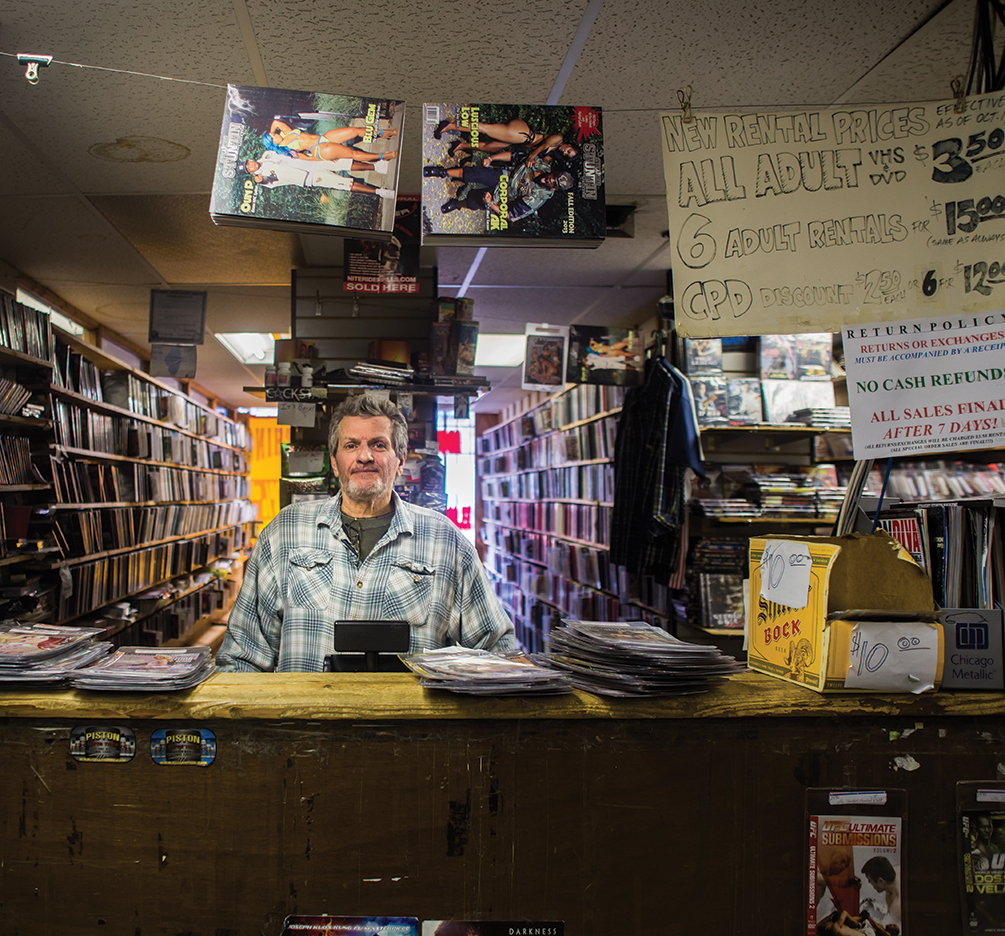
At 79th Street Video, a video rental store purported to be the home of Chicago’s largest selection of martial arts movies, founder and owner Russ Pine pulls the movie “Shogun Assassin” out from the shelves. He slams it onto the counter and beams. He says that the film, which features a child in a bulletproof baby carriage, is “the best martial arts movie you’ll ever see.” The cover, which he analyses meticulously, is proudly garish. The title is painted in blood. The shogun assassin himself is painted with a grimacing double chin. His son peeks out from a bloody carriage reminiscent of Ben-Hur’s scythed chariot. Together they frown, their backs facing a sweeping cloud of fire.
Pine thoroughly details the immense skill of the baby carriage man and his fierce loyalty to his kin—“no one messes with his kid, the shortie.” He describes the dozens of swordsmen who attempt to hunt him and fail. Pine himself is frail in a stained gray sweatshirt. He hunches from the weight of the oxygen machine slung around his shoulder. And yet, he eagerly grabs a stray ballpoint pen. “Imagine this is six to eight feet long,” he requests, before he spins, slices the air, and whispers whooshing sound effects. When he moves, the mist from his oxygen machine forms parallel dancing arabesque clouds. He wheezes, smiling. “Not many can escape with their lives, let alone harm this man. The shonen always bites off more than he can chew.”
“This movie is pretty hardcore,” Pine insists. He flips to its back cover, and points to a screenshot of a man with a sword lodged in his skull. “See?” He flips the movie back to the front.
“This movie was also banned in 1983,” he says, and points to the label—“BANNED SINCE 1983!!”—which is adjacent to the equally loud tagline, “HE WHIPS OUT HIS SWORD AND RELIEVES HIS VICTIMS OF THEIR HEADS!!”
Pine looks up and smiles. “1983—that’s the year our store opened.”

Due to Pine’s declining health, 79th Street Video is slated to close by March 15. “I’m just too sick to take care of everything now,” he explains. From when Pine first opened 79th Street Video in April 1983, the store has accrued a selection of 45,000 movies. “We were bursting at the seams,” he remembers.
Robert Hannigan, who snakes around the store’s shelves and places some returned movies into milk crates with the cardboard label “Russ’s Hot picks,” describes the previous store as “six or seven Blockbusters. You would walk in, and there were rows, rows, and rows of movies.”
In 1999 the store moved to its current location, a more modest space on Western Avenue and 81st Street, a few blocks away from their original 79th Street site. The move brought no harm to their business. “Well,” Pine says, “we are on the best, the busiest street in Chicago. There are more cars here on Western Avenue than on any other street. I heard that more than 50,000 cars drive on this street every hour.” He also notes appreciatively the area’s growing diversity from its white suburban roots.
Even now, in the business’ last breaths, Pine continues to purchase and distribute movies, and diligently works to fulfill his customers’ requests. He pulls out a yellowed notebook from his desk. Most of the pages crinkle from the weight of months’ worth of aggressively scrawled ballpoint pen. Some pages have small coffee stains. “If anyone comes in, and asks me ‘Man, I can’t find this film at all,’ I’ll write it down here.” Distractedly, he flips through the pages. Some begin to tear away from their dented spiral spine. “They can ask for anything. If they want hardcore things, if they want adult films, anything X-rated, I’ll put it down. I’ll get the movies fast.”
After an hour in the store, this is the first time that Pine has mentioned porn, which is odd, given the place’s décor. Alongside posters of snarling samurai, the walls are plastered with grinning women in thongs and stilettos. There are large posters advertising the latest installment of such series as “Nerdzzz.” On the front desk, a worn, laminated catalogue features the more graphic screenshots of available films. A wide selection of male enhancement creams and pills hangs from the counter.
To show parts of “Legend of the Fist” (where Donnie Yen, “the greatest kung-fu actor” portrays Chen Zheng, “the world’s greatest martial artist who ever lived”), Pine uses a television covered in stickers that advertise products like the “Nite-Rider” and the “Cockstar.”
Often regulars come in and warmly greet Pine—“Uncle Russ”—before flipping through the new porn selections. Others ask about his doctors’ appointments, quietly concerned. Pine affectionately pats one man, whom he lets behind the counter to see that day’s shipment. “This shrimp, he’s my bodyguard.” They both laugh.

The store’s journey toward renown began with none other than “Shogun Assassin,” the first martial arts movie added to its inventory.
“A customer suggested the movie, and it sounded vaguely familiar. But when I saw the baby carriage, I knew,” says Pine. He had seen the film a few years earlier, and thoughts of the “baby carriage movie” lingered.
“Shogun Assassin,” dubbed in English, is strung together from two movies in the “Lone Wolf and Cub” franchise. The uncannily precocious son, the “shortie” himself, narrates the movie, accompanied by a throbbing, undeniably eighties synthesizer soundtrack. Often, the scenes are painted with bright velveteen blood, and triumphant fountains spray from severed necks. The movie is delightful and ridiculous. But Pine sees more in “Shogun Assassin” than its ceaseless, nonchalant slaughter of unprepared swordsmen. Frankly, Pine isn’t fond of movies with just “killing and blood everywhere,” but he appreciates the movie’s portrayal of honor. He appreciates its storytelling: “this movie is just filled with a fantastic story, a fantastic plot.”
“Nowadays, guys mostly want movies with just killing, killing, killing. Not me, though. It has to have a good plot. If it has a good plot with twists and turns, I will love it.”
Pine does love movies, and has for decades. Before he owned 79th Street Video, he rented movies every day. In between his two jobs, in between caring for his children, he says, “I wouldn’t sleep—I would watch movies.”
Pine started the business with his favorite movies: classics, thrillers, dramas, and deep mysteries. But he was eager for recommendations—he remembers a suggestion box with a giant sign that had been in front of the original store, promising: “If there’s a movie we don’t have, just write it down and we’ll try to get it.” Every two weeks, Pine would purchase the suggested movies. He relied on his customers, his “martial arts maniacs,” to cull his vast selection. “After all,” he says, “who would know more about martial arts than the martial arts maniacs?”
The collection grew big enough to appease even the biggest maniac. “The maniacs would come in and they’d say ‘Oh my god, you’ve got “Kid With The Golden Arm!” You’ve got everything!’ ” Distributors who wanted martial arts movies began looking to his store.
Pine loves classic movies, but he can still appreciate the changing martial arts industry and the improvement of technique on the part of the actors. “There’s a lot more hand-to-hand combat now,” he explains. “That’s harder to pull off, to choreograph proficiently, than to have swords clinking together.” He pulls out two pens again, and links them together. “See, it’s pretty easy.”
Pine does occasionally have bitter customers, who insist that there are no new good martial arts movies. “I usually ask them what the latest good martial arts movie they saw was, and they usually name a Bruce Lee film. Well, Bruce Lee is great, I tell them, no one can deny that, but I ask if they’ve ever heard of Donnie Yen. Usually they shake their heads.” He chuckles. “Well, then, I tell them, you don’t know martial arts at all.”
Pine rushes to the shelves to find one of Donnie Yen’s movies to prove he is the greatest living kung fu actor. He returns, gesturing to a photograph of Yen’s bloodied, rippling chest on the box of “Legend of the Fist.” “He is a magnificent creature,” Pine says. “And to think he was in his late forties then—he’s fifty now and still making movies.”
“You know what I think about often,” Pine confides to one regular, staring at the television showing Donnie Yen whip a nunchuck at hoards of enemies. “I think about when I was really into the movies, in the eighties.” These were the days before Pine’s collection had reached the quintuple digits. “I think about what would have happened if instead of making this store, I would have gone over there, if I had gone to China or Japan, and I would have relayed my ideas about the movie theater, about the movie industry.”
The customer looks up and slowly nods. “Wow, that would have been something.”

Pine insists, “You can’t be grumpy to your customers, but they can be knuckleheads, sometimes. They’ve got no patience.” He laments their tendency to judge films by their covers.
“When I suggest movies to them, they tell me ‘that looks boring.’ I ask them, ‘Did you even read the back cover?’ ”
Pine pulls a Blu-ray edition of “War Horse” from the display. “I gave someone ‘War Horse’ a while ago, and they rolled their eyes, said it’s just about a sappy little kid.” He waves the movie around. “A sappy little kid? Don’t tell me that this is just about a sappy little kid. ‘You didn’t watch a minute of it, did you?’ I ask them. And they squirm. Of course they didn’t. They wouldn’t be saying it was about a sappy little kid if they did.”
Pine turns around again and brings out the movie “Goodfellas.” “I got in a customer the other day who didn’t want to watch this because the people on the cover were just standing.” Pine rolls his eyes. “Well, I tell him, what do you want them to do, throw a grenade?”
“It’s like in the movie ‘Ran,’ ” Pine says, referencing a 1985 Kurosawa movie centered on three sons who impatiently wait for the abdication of the king, their father. “You’ve got to keep mind over matter. You can’t be impulsive. Haste makes waste.”
But Pine does love and care for all his customers, knuckleheads and maniacs alike. “Too many people don’t care about their customers, but I really want to be sure our customers have their needs fulfilled. I’m never going to give a bad suggestion.”
So is Pine himself a martial arts maniac? “Oh, no, not at all. I used to be, maybe, a long time ago. But now I’m in my sixties, it’s just too hard to keep up. I leave everything to the true maniacs.” The movies have just become so entwined with his work and his life—“I married my movie distributor,” Pine boasts—that they relinquished their role as a consuming hobby.
Pine talks about the vacations that he and his wife take to the Caribbean. He looks to the front counter and shuffles together strewn papers, dog-eared catalogues with women leaning against pick-up trucks, hot pink business cards. He brushes them to the side to nestle against the growing pile of relevant movies he had pulled from his store’s shelves to color our conversation. Underneath, he finds a stick of lip balm, and he dabs it against his lips. “I’ve never really watched a movie on vacation, ever.”
Maniac or not, Russ Pine without his video store backdrop would feel almost like a martial arts film without the fighting. He turns to looks back to the vast, disheveled labyrinth of shelved films behind him; the mist emanating from his oxygen machine drifts off into its depths. “The rental movie, I think, is the greatest invention on earth,” he says.



